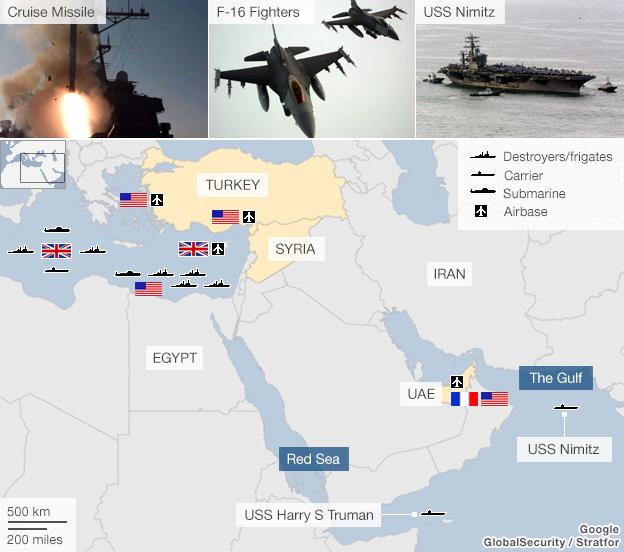Syria crisis: David Cameron says 'world should not stand by'
- Published
- comments
A second parliamentary vote would not happen until at least early next week, as Nick Robinson reports
The UK National Security Council has agreed the "world should not stand by" after the "unacceptable use" of chemical weapons by the Syrian government, says the PM.
The emergency meeting agreed a recommendation to be considered by the cabinet on Thursday.
Britain has also drafted a UN resolution authorising "necessary measures" to protect civilians.
It was discussed at a UN Security Council meeting in New York.
The resolution condemns the use of chemical weapons and demands that the regime of Syrian President Bashar al-Assad cease to use such weapons.
The Syrian government has denied it is responsible for a suspected chemical attack near Damascus on 21 August in which hundreds of people are reported to have died, blaming opposition forces.
'Complete catastrophe'
Earlier, the prime minister gathered the UK's military and security chiefs, along with key cabinet ministers, in Downing Street for emergency talks.
The National Security Council "agreed unanimously" on a recommendation, the details of which are not known, but which will be considered by the cabinet. It also backed the UK's draft UN resolution.
MPs will vote on a motion on Syria on Thursday after Parliament was recalled from the summer break to debate the crisis.
The UK Labour Party says it will only support the prime minister if the UN can first consider a report from weapons inspectors currently investigating the alleged attack.
Labour leader Ed Miliband said the party will table its own amendment on Syria in the Commons.
He tweeted, external: "Our amendment will insist the Prime Minister must return to the Commons after the UN weapons inspectors have reported."
BBC political correspondent Norman Smith said Labour's stance made the vote more precarious as the weapon inspectors' report could be "days away".
"It massively complicates the military logistics and profoundly complicates the vote. What we don't know is how much of a red line this could be for Labour," he said.
Our correspondent said that although the prime minister does not constitutionally need the vote to act, losing it would be a "complete catastrophe" politically.
"It would make it almost politically impossible for him to proceed because of the legacy of Iraq," he added.
Shadow foreign secretary Douglas Alexander told BBC Radio 4's World at One programme the coalition should publish any legal advice it has received from the attorney general on the justification for UK involvement.
A number of Conservative backbenchers have raised concerns about military intervention - but it is understood Tory MPs will be told to support the measures.
'Ready to go'
Mr Cameron announced the draft UN resolution in a series of tweets, external, adding: "We've always said we want the UN Security Council to live up to its responsibilities on Syria. Today they have an opportunity to do that."
William Hague: "By far the best thing would be if the United Nations could be united. If there isn't agreement we still have a responsibility"
The council, which meets whenever peace is threatened, external, is made up of 15 members, including permanent members China, Russia, France, the US and the UK which have the power to veto any resolution.
Previous efforts to secure action against President Assad have been vetoed by Russia and China.
Foreign Secretary William Hague said talks at the UN would continue "over the coming days" but he insisted the international community still had a responsibility to act in a "legal and proportionate" way if an agreement could not be reached.
"This is the first use of chemical warfare in the 21st Century, it has to be unacceptable," he said. "We have to confront something that is a war crime."
When asked by reporters about comparisons with Iraq, he said the situation was "entirely different" as a "crime against humanity had been committed" in Syria.
In other developments:
UN weapons inspectors have returned to the site of the suspected attack after a day's delay over security concerns
UN special envoy to Syria Lakhdar Brahimi said it seemed clear some type of chemical substance was used "that killed a lot of people"
Asian stock markets fell, extending a global sell-off sparked by growing fears of a military strike against Syria
A YouGov poll of nearly 2,000 people suggested 50% were against a missile strike, while 25% were in favour, external
The Stop the War Coalition called on the British public to oppose what it called "another disastrous military intervention" ahead of a protest at Downing Street due to begin shortly
The Archbishop of Canterbury Justin Welby warned MPs not to rush any decision, saying the consequences of military action across the Muslim world were unpredictable
It is understood the most likely military response would be a one-off or limited guided missile strikes on Syrian military targets fired from US Navy warships.
The US has said its forces are "ready to go" but former UK military chiefs warned a one-off missile strike could see the UK dragged into deeper action.
Admiral Lord West, a former first sea lord, said: "You can do a surgical strike but you need to be clear what is your whole campaign plan, where do you go from there?"
BBC defence correspondent Caroline Wyatt said it was understood military targets had already been chosen and they would probably focus on command centres believed to be involved in the use of chemical weapons.
She said cruise missiles could be launched from US ships in the Gulf or the Mediterranean, or Royal Navy vessels including submarine HMS Tireless.

- Published28 August 2013